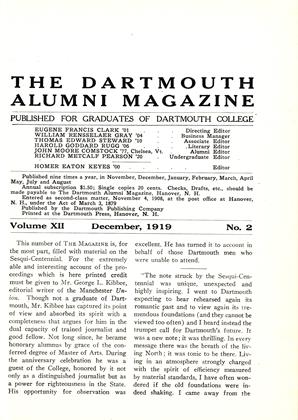The following editorial from the last number of the Phillips Andover Bulletin expresses so admirably the real basis on which drives to increase professorial salaries, should be made that it ought to have wide circulation:
“This is a day when the troubles of teachers are being exposed, with perhaps too little re- ticence, to a public which shows signs of be- ing bored. A well-meaning business man said not long ago : ‘This chatter about the poverty- stricken teacher makes me tired. If a teacher doesn’t like his job, why doesn’t he resign? The truth is that there are mighty few teach- ers who could earn more money in any other occupation.’ There are plenty of Andover in- structors who could refute the charge that teachers are temperamentally unfitted to make good-sized incomes, among them the young teacher of science who left the school to ac- cept an army commission and was recently offered a position at $lO,OOO a year. But such refutation is unimportant. What the business man failed to realize is that the teacher who sees in his position only what it brings to him in his salary check is likely to be a poor guide for boys. Teachers, like clergymen, have chosen a profession which emphasizes always the nonmaterialistic elements in life. You can’t really compensate with money the physician who adds five years to your career or the minister who renews your faith in God; no more can you repay the teacher who lays in your son the foundations of wisdom and character and starts him on his way through the world with high ideals. The contention that a particular teacher can earn no more in business is absurd. It is not his aim to earn money. He has not been trained to compete with tradesmen. As an amateur, he is always at a disadvantage as compared with a professional.
“And so those who are urging increased salaries for teachers must carry on the de- bate largely on the ground of mere justice. They have their practical argument, but it runs like this. If you do not supply teachers with good food, good clothes, good living con- ditions, and a reasonable number of life’s lux- uries, they will become narrow-minded lead- ers of youth. If you allow a sense of injus- tice to take root in their hearts, how can you hope for cheerfulness, for inspiration, for the stimulus to unselfish living. When a philoso- pher is pinched for bread and clothes, it is not easy for him to preserve his equanimity. When his children beg for pleasure which he cannot let them have, even the most inveterate optimist will have his hours of moroseness, if not of despair; and his mood will be re- flected in his elucidation of Caesar or his dis- cussion of Matthew Arnold. Here is the strong practical argument for paying teach- ers well. On them depends, to a very large extent, the progress of the race. The doctrines which they impart will, in another generation, bear fruit, some twenty, some fifty, and some an hundred fold. Let us see to it that the harvest is one of good corn in the ear, and not of weeds and tares.”
 View Full Issue
View Full Issue
More From This Issue
-
 Article
ArticleTHE SESQUI-CENTENNIAL
December 1919 By George Levi Kibbee -
 Article
ArticleDARTMOUTH COLLEGE: AN ATTEMPT AT FORMAL INTERPRETATION
December 1919 -
 Article
ArticleREPORT OF TRUSTEES MEETING
December 1919 -
 Article
ArticleNEW ENGLAND STATES
December 1919 -
 Article
ArticleThis number of The Magazine
December 1919 -
 Article
ArticleFALL MEETING OF ALUMNI COUNCIL
December 1919 By Homer E. Keyes







